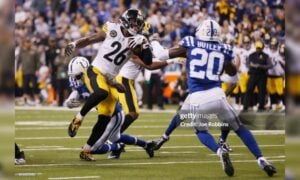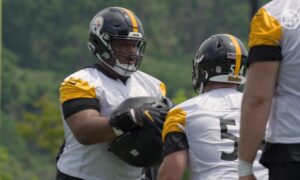For as much amusement can be extracted from some of the techniques that New England Patriots attorney Daniel Goldberg invoked in writing The Wells Report in Context, which was the organization’s attempt to rebut the findings of investigator Ted Wells, whose data was used by the league to issue its discipline, there really is one legitimately fundamental error in its defense, all jokes aside.
Put simply, Goldberg’s screed asks us to accept the testimony of a variety of parties, particularly the most interested parties, on face value, while scrutinizing all of the testimony that contradicts his narrative of the organization’s innocence.
In other words, trust us, not them. We’re the victims here.
The fact of the matter is that neither party is entitled to, or should expect, blind faith in accepting the testimony that supports its position. Yet, on a number of occasions, the text dismisses assertions made by Wells by the virtue of citing as proof the fact that an individual claimed otherwise.
As an example, in reference to the texts exchanged between Jim McNally and John Jastremski concerning footballs that were overinflated during an October game against the Jets, Goldberg contends the following:
These inferences ignore the testimony given by both the author and the recipient of various ill-stated attempts at humor contained in texts. No witness gave the texts the meaning that the report attributes to them. No independent evidence confirmed how the report interprets the texts. The report simply speculates that all the selected texts had to do with improper football deflation after the referee’s inspection, although not a single text mentions any such thing.
Given that Goldberg’s profession is as an attorney, he certainly knows better than to make the argument in a court of law that, because the accused claimed that the investigator misinterpreted a conversation, then credence must be given to the accused. It is assumed that the accused would not be forthright about the actual intent of the conversation, given the obvious bias.
Later in Goldberg’s text, he asserts that a reference to Tom Brady in a text exchange between McNally and Jastremski does not actually refer to Brady because it is “inconsistent with Mr. Brady’s expressed testimony that he never had any reason to — or did — express concern over any ‘stress’ Mr. McNally had”.
The validity of invoking the testimony of a defendant as proof of his own innocence rests on the assumption that the testimony will be truthful, embedded in which is a subset of additional assumption that includes the idea that the defendant would willfully incriminate himself in order to maintain the truth.
Beyond these obvious examples, Goldberg also calls into question the of a League consultant about the ability to deflate 13 footballs in 100 seconds by virtue of the fact that the accompanied letter was signed May 6, the day the report was issued.
Simultaneously, the text expressed confusion as to why Wells was not overly interested in the testimony of witnesses that the Patriots actively volunteered, and even pushed onto the investigation, despite reservations about limitations placed on the prospective interviews.
It is at a very fundamental level that Goldberg’s defense on behalf of the Patriots organization is flawed, because at its very basis is the premise of the presumed honesty and innocence of those who are accused of wrongdoing.








